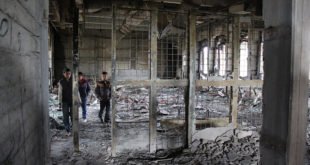Ian Ritchie, former CEO of MBC, took over as CEO of Associated Press Television News (APTN) a year ago. TBS Senior Editor S. Abdallah Schleifer spoke with Ritchie about APTN and its Middle East Custom Coverage, his experiences at MBC, and the direction of broadcasting in the Arab region.
S. Abdallah Schleifer: What is the relationship between APTN and AP?
Ian Ritchie: The Associated Press decided in 1994 to go into video news; previously it had been in text and photos primarily. In 1994 they set up APTV as a wholly owned subsidiary. They decided to base the operation in London and to give it a separate legal constitution, separately audited but obviously wholly owned, and that's still how it applies today. There was an aggregation of ownership within the global news agency business—Reuters bought Visnews, and then in 1998, APTV bought WTN from ABC. In 1998, APTV became APTN and now really the two major global video news companies are Reuters and APTN.
Schleifer: To what degree would you say that Reuters and AP constitute the market in terms of percentage?
Ritchie: In terms of video it's in excess of 90 percent with the two combined. We share a large number of clients; most of the big international broadcasters will take both. But perhaps people are increasingly looking to take one agency because they're being careful on the costs, and because there are many stories that we both cover. Between the two of us we have the vast majority of the market.
Schleifer: How many bureaus do you have now?
Ritchie: We have 83 around the world, which gives us very good coverage. With the content that we aggregate, circulate, and distribute from London headquarters, we actually provide from here the services to CNN, ABC, NBC, MBC, and Fox. We do it from here because they aren't looking for US coverage, they have that—they're looking for international coverage.
Schleifer: Which the networks themselves have cut back on dramatically, because of the existence of APTN.
Ritchie: Precisely. If there is a big story then they will send their own correspondent, obviously, and the American networks still have major bureaus here in London, but not in other parts of the world. An interesting example recently is the spy plane story in China. We have very good relations with the Chinese, Chinese television is one of our clients, we provide facilities for them and they help us with facilities. Because we have this relationship we were able to offer not only pictures but also the ability through satellite links to play the pictures out from China. Although we have these bureaus and we have our crews and facilities, part of the interesting two-way relationship with your clients is one where they offer you the picture to distribute. We are in a competitive situation with Reuters, so we obtained for example from Al-Jazeera video of the statue destruction in Afghanistan and distributed it exclusively. It's really about trying to get into a relationship with the broadcaster, where we have a position of first refusal.
Schleifer: Are your partners not just clients and not just possible suppliers of material, but also supplying you with satellite facilities?
Ritchie: No, they use ours. A big part of our business, apart from the main news provision, is what we call broadcast services, which is the provision of uplinks, crews, edit facilities. Al- Jazeera started by using our crew to a great degree. Apart from the Middle East, we don't provide reporters, but what we will do is provide a crew and edit facilities and an uplink for a client's reporter.
Schleifer: Is the Middle East the slowest in terms of responding to field reporting? What about Africa—do they do more field reporting of their own?
Ritchie: Africa is still for us quite a difficult area; there are large parts, other than North Africa and the SABC in South Africa, that the satellite coverage doesn't reach. And there really isn't a market in much of those areas. But in the Middle East there are still people looking to expand their news services—Kuwait wants to expand, MBC, and there's still a great appetite for news coverage in the Middle East and there's the money to pay for it.
Schleifer: Before APTN you were with MBC. Do you think being involved in global news coverage for MBC was a preparation for this?
Ritchie: I think it was, because I'd worked solely in UK broadcasting before for nearly 20 years, and MBC was my first real foray into international news. MBC set out originally to be the CNN of the Arab world; my mandate was to change it into a more commercial channel and therefore the news played less importantly perhaps to entertainment and sport, because that what advertisers want to see. That's why I did the deal to bring the U.S champion league to MBC and a deal for "Who Wants to Be a Millionaire?" But that's correct, as far as I was concerned it was an exposure to international news which has helped me in this job.
Schleifer: MBC had a great formula when they started out because nobody was doing international-standard news in Arabic at all, so they took the ratings everywhere. Does the shift begin with the launch of Al-Jazeera?
Ritchie: I think there were two shifts. One, it is very difficult if you are a broad stream channel to compete with a solely news channel. When MBC started, although there was an emphasis on news, it still had broader based programming. You can't compete, if you are a broad-based entertainment channel, with a 24-hour news channel and Al-Jazeera took this advantage. Second, the key issue I was there for is to make it commercially successful. Al-Jazeera may get great critical and editorial coverage, but it didn't make money. MBC certainly, by the introduction of broader-based entertainment, sport, etc., improved the revenue significantly.
Schleifer: Part of that was that you had a substantial revision of staffing?
Ritchie: Yes, we had a major redundancy exercise, which I think was unusual and difficult in the circumstances. But we did improve the revenue, and there was a ten-fold improvement in the financial position which was essential, and something the shareholders wanted to achieve. Now where they go from here I think is a very interesting situation.
Schleifer: Why did you leave MBC?
Ritchie: I think it was the usual pluses and minuses. I was heavily involved in the discussion of going to Dubai, and whether or not I wanted to go there personally. In some ways it was an interesting opportunity and in some ways it was an upheaval. At absolutely the same time I was approached about the job here. Here was an opportunity to build further, to have a really global situation. From my point of view being involved in running a news agency was a little bit different than broadcasting. At MBC I had some significant disadvantages like not speaking Arabic, but the basic principles of running a commercial broadcaster were very much the same. I had huge support from Sheikh Waleed, who was visionary in setting the situation up, and as far as I was concerned took great courage to appoint someone like me to the job. I always used the analogy of the BBC—can you imagine appointing somebody foreign to be the director general of the BBC, someone who didn't speak English? What I now find interesting is getting away from broadcasting, having done it for 22 years. A global news agency was an interesting situation as far as I was concerned.
Schleifer: At MBC as chief executive, you took a personal responsibility for news?
Ritchie: I was responsible ultimately for the content of the whole channel. The key issue for me was being responsible for the advertising revenue. As you pointed out there were some redundancies in the beginning to get costs right, but the next key to success was to get the sales operation properly organized so we could maximize the revenue. Here at APTN, after the merger of WTN which happened before I arrived, the cost basis is a very efficient one and therefore what we are looking at is providing customer service and looking at ways of generating revenues. The dust has settled, the two organizations have been brought together. I was lucky in the timing, that this matter was done and therefore my issue is to look toward the future.
Schleifer: Although you have been here for a short time, you were dealing all the time with news agencies through MBC, which gives you a sense of the operation. Where do you see APTN coming from and where do you see it going?
Ritchie: APTN comes from a really sound editorial background. When I was at MBC I was a customer of both Reuters and of APTN, and the key issue is still the quality of what you provide to the customer. That really means editorial coverage; it means we have a bureau infrastructure in place and that we have journalists in place to provide that sort of quality, and I think we're doing that extremely well. The issue for me in the future is twofold: how do you build on that and maintain that, and secondly how do we expand our content offering, because that is an area we need to look at very carefully. We are in the content business, and therefore how we expand our content, and how we drive that into a revenue stream, is extremely important for us. If we are not profitable—which we are, but if we don't maintain that—then we can't continue the investment in the infrastructure.
Schleifer: Do you see shifts in delivery systems?
Ritchie: There's a move toward Internet delivery; we're using telestream, which is non-real time at the moment. When you've got non-real time and can afford to take a couple of hours to send a five-minute piece, that is what telestream can do, and at a pretty good technical quality. The big issues are how long it takes to deliver and what the technical quality is. Bear in mind that we service broadcasters. For example, if you talk to NHK in Japan, they're really keen about news being in high definition quality, not just normal and certainly not digicam. We're using digital Betacam in most of our bureaus, but we're gradually phasing in the digicams, and we find the quality fantastic. They're considerably cheaper and much more lightweight, and the ones we've put in the field so far have been extremely good. I think from our point of view they're much safer. If you're carrying a large, heavy camera you're first of all much more obvious to people who may want to target you, and second, if you're the cameraman looking through an eyepiece you're not very aware of what's going on around you. If you're using one of the new lightweight digital cameras, they're less obvious, and it's easier for the cameraman to be aware. And of course if you want to do more clandestine filming, they're easier to put in a bag. But the key issue is that they're much cheaper, and the quality is getting better. And if you move into a situation of Internet delivery systems down the road, it's also a much cheaper means of delivery than satellite. The cost of entry into being a global news provider therefore goes down.
At the end of the day, though, it still comes down to content. It's important for us as a service provider to be at the forefront of the technology, whether it's satellite phones or Internet delivery, and we will continue to invest in all of those things. But you still have to have someone filming stories, decide where you're going to go and how you're going to cover it. You have to have the caliber of journalists.
Schleifer: Your journalists are cameramen, photojournalists. With the exception of the Middle East you aren't putting reporters out in the field. Are they providing text to go with the footage?
Ritchie: We send a script on all our pieces out on satellite, and we also put it on the Internet so clients can access the scripts there too. It's a basic description of what happened—it's very important for us to maintain editorial integrity, so there's no "spin" on an event at all. It's very detached. If the broadcaster puts their own spin on it, whether for a particular region or for the interest of their viewers, that's entirely a matter for them to decide.
Schleifer: There's sometimes a curious relationship between technology and quality, that as we get more and more technologically acute then the journalistic sensibility declines, journalists and producers become packagers and rely more and more on wire copy. People become masters of technology, but are weak in terms of content. This is aggravated by technology that allows, and therefore we insist upon, live, instantaneous news. Given that, how do you recruit people to send out in the field?
Ritchie: I think the good journalism is still absolutely fundamental. We'd rather see someone with a good, sound journalism background and teach them how to shoot—especially because these new cameras are easy. We want somebody to be in the right place at the right time, have a nose for the story, and know enough on the camera to be able to get the pictures. This is a generation that grew up with video cameras at home. When you give them the next step up in a professional situation, they're perfectly comfortable with it.
This question goes back to the point about the content being more important than the technology. We are providing serious journalistic cover to newsrooms around the world. Our clients are professionals and we have to match that. The journalism is what wins and what distinguishes. But there's no point in being at the right place at the right time if you haven't thought about how to get the pictures back. We had an exclusive this year about Mir coming down to earth. We planned it; we had five or six photojournalists in the likely landing areas. The man who shot it was in the right place, but it was planned that he be there. We also won out because he had the technology from that beach, a satellite phone, to get the pictures back live. It worked extremely well, because that's what people wanted—they wanted to see it near to live. This is still the drawback with the Internet; more and more of our customers are interested in live. With 24-hour news channels, they need it live or extremely close to that. The satellite is still the delivery system for that, as opposed to telephones or Internet.
The journalism skills are so fundamental; everything else is an adjunct to that. What distinguishes our coverage is getting the pictures and being there, whether it's a scheduled event or breaking news.
Schleifer: How do you see broadcasting in the Arab world now that you're seeing it not as a broadcaster but as the head of an operation that's serving the region?
Ritchie: It's confirmed for me what potential the region has. I think audience research is a key issue. I was recently in Russia, and Russian TV advertising collapsed in 1998 but they're very confident that it's coming back in 2001. One reason for this is a new deal with Gallup to get considerably greater audience research, not just in the major cities but in the outlying areas. The biggest single impediment to increasing advertising revenue in the Arab broadcasting world is the lack of coherent, mutually accepted audience research. We tried at MBC to set up a pan-Arab research company that would be fully objective—the difficulty in the region is that whoever is paying for the research feels they get a favorable situation. What you need is regular, reliable research independent of the broadcaster, and that everyone accepts. It can still be owned by the broadcasters, as long as the management is kept separate. Pure state funding of broadcasting in the Middle East is obviously still very high. What you really need to make Arab broadcasting more successful is a vibrant and strong commercial sector. The potential is there. There is a very affluent group of people in the Middle East, but things are lagging partly because the multinationals won't invest until they see proper data. The ratings for "Who Wants to Be a Millionaire" on MBC over the last few months must have been fantastic. Who can say to the advertiser, if you want this prime spot, here is the appropriate rate. If you can demonstrate the figures, you'll get the multinationals to spend the money. If you can't, it's a difficult discussion to have. If there were one single issue that would revolutionize broadcasting in the Middle East, it would be a get-together of the major broadcasters to agree on a currency of ratings that was carried out through a credible international organization.
Schleifer: Between free-to-air and pay-TV, there are an incredible number of channels in the Middle East. Are the airwaves too crowded?
Ritchie: It's not certainly uncommon in the Middle East, people wanting to put money in television and media interests. You look at all these channels and wonder if anyone can pay the cost of supporting them, pay the cost of proper content. Where is the quality of programming that people want to see? The trouble with this dilution, this increase in the number of channels, is that nobody has the programming ability to pay for the cost—or they're loss leaders, but how can anyone sustain loss leaders for five, six, seven years. When you have a successful property, the viewers will go to that, they'll watch something with high production quality. That means you have to spend money. People get into a cyclical situation where they don't spend enough money on the programming, and therefore have no chance of generating advertising, which means they can't spend money on programming.
I think there's a huge opportunity in the Middle East for a commercially driven, wide audience appeal, genuinely pan-Arab channel, reflecting within the schedule various elements of the region—Egyptian, Lebanese, Jordanian. People want to see Egyptian drama, programming from the Gulf countries. To me it's a balance between the western elements in the schedule and the non-western. This is a relatively sophisticated audience, and they want to see western production standards. You can't expect them to watch a multi-million-dollar feature film, then sit through a $20,000 drama production. Obviously they can see the difference, no matter how talented the actors and directors are.
Schleifer: How do you see Dubai emerging? MBC is moving, Reuters is making it a regional hub, Middle East Business News, and others. Do you see Dubai as a serious player?
Ritchie: The major reasons for people relocating there are cost and the tax environment, which is extremely good, and the infrastructure to support them. My first boss in television said to me that the viewer doesn't really care where the programs are produced. To me the big issues about where you're based and where you're transmitting from are, first, cost. MBC went to London, others went to Rome, and we were caught with high taxes—political independence, yes, but with a high cost base. Dubai, in contrast, is offering a low cost base, a good tax agenda, and political freedom as well. Cairo and Beirut are two obvious places for production, as they offer relatively low costs and most of the facilities, plus audiences, guests, and technical production talent. But sometimes those places aren't as inexpensive as you might imagine them to be. You have to look at the total package. After cost the biggest issue is how close you are to your audience—not geographically, but how plugged in are you, how plugged in your newsroom and production staff are to an area. You get a different view of things if you've spent the last ten years in London than you do if you're based in Cairo, Beirut, Amman. The classic broadcasting success story is always to be closer to your customer.
Schleifer: You have a unique service at APTN, which is Middle East Custom Coverage. How is this developing?
Ritchie: Initially it was more customized; we provided reporters and did pieces to camera. More and more we're providing the facilities—the satellite links, feeds, studios—but not so much the actual reports to camera. The market is changing. This doesn't happen just in the Arab world, but people will afford their own journalist/reporter in the obvious places like Jerusalem or Washington, but in the other 98 percent of the world don't want the cost of their own person there. How else, therefore, will they get the material they need to have if a story comes up there. If there's an earthquake in El Salvador, they'll want the pictures, we provide that service, and we'll get an Arabic-speaker in front of the camera.
I still see the Arab world for us as a growth opportunity. We still provide better services, we provide tailored services that are unique within the region, and we have felt in the last year or so that there is a greater appetite for this than ever before. We want to grow on that, and I think that's what we'll do.
 Arab Media & Society The Arab Media Hub
Arab Media & Society The Arab Media Hub





